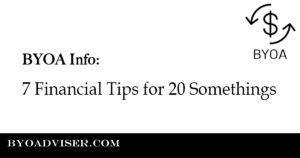- Create a budget – One of the first things you can do to educate your on how to develop a personal budget. You can utilize free resources like Mint.com or Personalcapital.com. This can help you visualize your accounts and spending. This is a first step to investing in your future.
- Understand how to use credit – Before you jump into credit card debt, buy a car or buy a house make sure you understand how credit works. This means understanding how much you will pay per month and how the terms of the credit will affect your monthly spending. For example some loan types carry balloon payments (increases after a set period of time) or other terms that can be confusing.
- Invest early – One of the first things you can do to develop good habits is to start automatic investing this is the process of setting up automatic withdrawals the go into a retirement account. You can start with as little as $50 a month and continue to increase as your salary goes up. By making it automatic you remove the temptation of using those funds elsewhere.
- Save – Another tip before you begin to get into debt is to build an emergency savings fund. You can set a goal of at least $1000 and put it in a separate account that you do not have easy access too. This again will help you to have a safety net before you get into trouble and also develops good habits.
- Watch your expenses – Utilize the information from tip 1. Create a budget and know how much you’re spending on common items like entertainment, restaurants, social activities, and clothing. By understanding your variable expenses you can understand how much you have to spend in your budget and where you may be overspending.
- Pay off your school loans – If you have any students loans this should be another major area of focus. Make sure you understand the terms of any current loans you have and set yourself up to pay more than the minimum. The longer you take to pay off your loans the more you will pay the bank and the more it will prevent you from investing in your future.
- Understand debt – One of the biggest things that we hear about is people not understanding the terms of the debt that they have. It is important that you ask questions before and after you acquire debt. Here are some big things to understand:
- What is the APR (annual percentage rate) of the credit?
- What is the length of my repayment?
- Is there penalty for early repayment?
- Is my interest rate (APR) fixed or variable?
- How much can I afford and is it within my budget?
